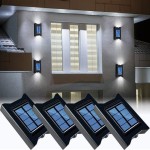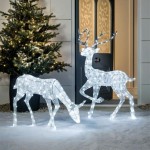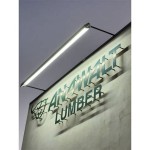Best Colour for Outdoor Lights: Illuminating Your Exterior with Style and Functionality
Outdoor lighting serves a crucial purpose in enhancing safety, ambiance, and curb appeal. Selecting the right light colour is essential to create a cohesive design that complements your home's exterior and improves visibility.
Types of Light Colours
Light colours are typically classified into three main categories:
- Warm White (2700-3000K): This light emits a cozy, inviting glow that resembles traditional incandescent bulbs. It is ideal for creating a warm and welcoming atmosphere on patios, porches, and gardens.
- Cool White (4000-4500K): This light provides a brighter, more modern look. It mimics natural daylight and is suitable for areas that require ample illumination, such as driveways, pathways, and security lighting.
- Daylight (5000-6500K): This light offers a bright, bluish-white glow that is ideal for illuminating sports courts, warehouses, and other large outdoor areas where high visibility is necessary.
Choosing the Best Colour
The best colour choice depends on several factors:
- Purpose: Consider the intended use of the lighting. Warm white is suitable for creating cozy ambiance, while cool white or daylight is better for illumination.
- Home Style: Warm white is typically associated with traditional homes, while cool white or daylight complements modern architecture.
- Surrounding Environment: Warmer colours can create a more inviting atmosphere in shaded areas, while cooler colours may enhance visibility in brightly lit areas.
- Context: It is important to consider the overall lighting scheme of your property. Ensure that the outdoor lights complement the indoor lighting and other exterior features.
Specific Colour Considerations
Besides the main light colours, certain applications may benefit from specific considerations:
- Motion Sensor Lights: Cool white is recommended for these lights as it provides good visibility and can help deter unwanted visitors.
- Security Lights: Daylight is ideal as it offers the brightest illumination for optimal security.
- Landscape Lighting: Warm white is often used to highlight plants and create a warm, inviting atmosphere in gardens.
- Path Lights: Cool white or daylight is recommended for walkways and paths to ensure clear visibility.
Additional Tips
Here are a few additional tips to enhance the effectiveness of your outdoor lighting:
- Use shielded fixtures to minimize light pollution and direct the light where it is needed.
- Consider using dimmers to adjust the brightness according to the occasion or time of day.
- Experiment with different light placements to create interesting shadows and highlights.
By carefully selecting the best colour for outdoor lights, you can transform your exterior into a well-lit and inviting space that enhances safety and adds to the overall aesthetic appeal.

Choose The Best Color Temperature For Your Outdoor Lighting Knowledge Base Super Bright Leds

Best Color Temperature For Outdoor Lighting Enhanced

What Is Color Temperature Creative Outdoor Lighting

Best Color Temperature For Outdoor Lighting Enhanced

Choose The Best Color Temperature For Your Outdoor Lighting Knowledge Base Super Bright Leds

Best Led Color Temperature For Outdoor Lighting Georgia Lightscapes Blog

Color Tones In Outdoor Lights Northwest Lighting

Best Color Temperature For Outdoor Lighting Enhanced

3000k Vs 4000k 5000k Best Color Temperature For Outdoor Lighting R C

How To Choose The Best Outdoor Lighting Color Temperature Custom Of America







